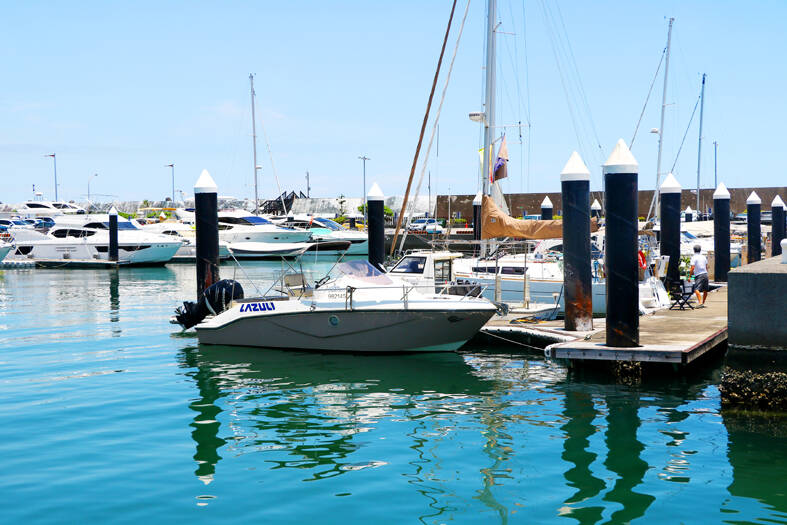The Ministry of Transportation and Communications is considering amendments to require vessels of all sizes to install automatic identification systems (AIS) in a bid to track ships near Taiwan’s shores as well as prevent Chinese incursions.
Under the Regulations for Small Ships Inspection and Measuring (小船檢查丈量規則) and the Regulations Governing the Management of Yachts (遊艇管理規則), small ships that are not used to ferry passengers are not required to install an AIS.
However, under the proposed amendment, all ships, except those on lakes, rivers and other inland waterways, would be required to install an AIS, ministry sources said this week.

Photo: Tsai Yun-jung, Taipei Times
The amendments are primarily a response to an incident in June last year, when a Chinese man was arrested after navigating a boat into a harbor near the mouth of the Tamsui River (淡水河), they said.
The changes would also help the government combat smuggling and improve operational safety for port and harbor staff, and Coast Guard Administration personnel, they said.
Under the regulations, small ships are defined as motor-powered vessels under 20 tonnes, or non-motor-powered ships under 50 tonnes, and are further separated into passenger-carrying ships, and non-passenger-carrying ships.
Yachts relying primarily on wind for propulsion with auxiliary engines are not required to install an AIS, but can instead put in radar deflectors under current regulations, but once the amendments are passed, the vessels must install an AIS, the ministry said.
Putting an AIS on small boats and yachts would help the Maritime and Port Bureau track all ships in coastal areas near Taiwan, it said.
The nation has 1,543 yachts and 13,146 small ships, with about 13,690 ships expected to install AIS should the amendments pass, the ministry said.
Ships that fail to comply with the new regulations could face fines of NT$3,000 to NT$30,000 under the Shipping Act (船舶法), it said.
A Class B AIS costs about NT$20,000, Maritime and Port Bureau Deputy Director-General Liu Chih-hung (劉志鴻) said.
The bureau is working with the Fisheries Agency to draft subsidies that would alleviate the financial burden for ship owners to install the systems, he said.
Under proposed plans, the bureau would subsidize the refitting of 4,609 ships that are not used in the fishing industry, while the Ministry of Agriculture would subsidize 9,081 ships, he said.

INVESTIGATION: The case is the latest instance of a DPP figure being implicated in an espionage network accused of allegedly leaking information to Chinese intelligence Democratic Progressive Party (DPP) member Ho Jen-chieh (何仁傑) was detained and held incommunicado yesterday on suspicion of spying for China during his tenure as assistant to then-minister of foreign affairs Joseph Wu (吳釗燮). The Taipei District Prosecutors’ Office said Ho was implicated during its investigation into alleged spying activities by former Presidential Office consultant Wu Shang-yu (吳尚雨). Prosecutors said there is reason to believe Ho breached the National Security Act (國家安全法) by leaking classified Ministry of Foreign Affairs information to Chinese intelligence. Following interrogation, prosecutors petitioned the Taipei District Court to detain Ho, citing concerns over potential collusion or tampering of evidence. The

NEGOTIATIONS: Taiwan has good relations with Washington and the outlook for the negotiations looks promising, Minister of Economic Affairs J.W. Kuo said Taiwan’s GDP growth this year is expected to decrease by 0.43 to 1.61 percentage points due to the effects of US tariffs, National Development Council (NDC) Minister Paul Liu (劉鏡清) said at a meeting of the legislature’s Economics Committee in Taipei yesterday, citing a preliminary estimate by a private research institution. Taiwan’s economy would be significantly affected by the 32 percent “reciprocal” tariffs slapped by the US, which took effect yesterday, Liu said, adding that GDP growth could fall below 3 percent and potentially even dip below 2 percent to 1.53 percent this year. The council has commissioned another institution

NEGOTIATIONS: The US response to the countermeasures and plans Taiwan presented has been positive, including boosting procurement and investment, the president said Taiwan is included in the first group for trade negotiations with the US, President William Lai (賴清德) said yesterday, as he seeks to shield Taiwanese exporters from a 32 percent tariff. In Washington, US Trade Representative Jamieson Greer said in an interview on Fox News on Thursday that he would speak to his Taiwanese and Israeli counterparts yesterday about tariffs after holding a long discussion with the Vietnamese earlier. US President Donald Trump on Wednesday postponed punishing levies on multiple trade partners, including Taiwan, for three months after trillions of US dollars were wiped off global markets. He has maintained a 10 percent

TRADE: The premier pledged safeguards on ‘Made in Taiwan’ labeling, anti-dumping measures and stricter export controls to strengthen its position in trade talks Products labeled “made in Taiwan” must be genuinely made in Taiwan, Premier Cho Jung-tai (卓榮泰) said yesterday, vowing to enforce strict safeguards against “origin laundering” and initiate anti-dumping investigations to prevent China dumping its products in Taiwan. Cho made the remarks in a discussion session with representatives from industries in Kaohsiung. In response to the US government’s recent announcement of “reciprocal” tariffs on its trading partners, President William Lai (賴清德) and Cho last week began a series of consultations with industry leaders nationwide to gather feedback and address concerns. Taiwanese and US officials held a videoconference on Friday evening to discuss the